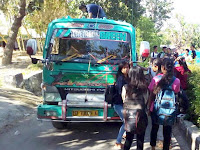Livestock as Potential Business a training on livestock by Stube-HEMAT Sumba
Monday, 6 November 2017by adminstube
Livestock has an important role in Sumba society. Besides asdomestic animals and meat supply, livestock also has social function as family pride, customs and savings that are easy to sell when people need money.
 As the time goes, there are major challenges faced by this island, such as decreasing soil fertility and decreasing the availability of adequate feed for livestock during dry season.It is the impact of careless field burning habit. The consequence is cattle having potential value such as horses, cows, buffalo, and goats are grazing difficulty during dry season and it is one reason of cattle population decrease in Sumba.
As the time goes, there are major challenges faced by this island, such as decreasing soil fertility and decreasing the availability of adequate feed for livestock during dry season.It is the impact of careless field burning habit. The consequence is cattle having potential value such as horses, cows, buffalo, and goats are grazing difficulty during dry season and it is one reason of cattle population decrease in Sumba. Based on the above reality, Stube-HEMAT Sumba held livestock training for students and church youth located at Kanatang sub-district office, on Friday-Sunday, November 3-5, 2017 with a themeLivestock as potential business. There were thirty seven students coming from various campuses in Waingapu and Lewa, such as STT GKS, STT Terpadu, Ukriswina, Akademi Komunitas Negeri (AKN).
Based on the above reality, Stube-HEMAT Sumba held livestock training for students and church youth located at Kanatang sub-district office, on Friday-Sunday, November 3-5, 2017 with a themeLivestock as potential business. There were thirty seven students coming from various campuses in Waingapu and Lewa, such as STT GKS, STT Terpadu, Ukriswina, Akademi Komunitas Negeri (AKN).Stube-HEMAT Sumba presented experienced facilitators in their field of animal husbandry, such as Drh. Oktavianus Kale Rohi from Animal Health Service of East Sumba regency, whodiscussed development of livestock population in East Sumba and government’s role in overcoming disease on livestock by knowing main diseases affecting livestock in East Sumba, such as Anthrax, Surra and intestinal worms.
 Next, Reni Ratni Ndapawole S.Pt., M.Si., a lecturer at Wirawacana Christian University of Sumba, explained development and management of animal feed in overcoming food crisis during dry season. Feed quality is determined by nutritional value of the fodder. There are two types of fodder that can be used during dry season, namely grasses and legiminosa (beans).
Next, Reni Ratni Ndapawole S.Pt., M.Si., a lecturer at Wirawacana Christian University of Sumba, explained development and management of animal feed in overcoming food crisis during dry season. Feed quality is determined by nutritional value of the fodder. There are two types of fodder that can be used during dry season, namely grasses and legiminosa (beans).Meanwhile, I Made Adi Sudarma S.Pt., M.Si., a lecturer at Wirawacana Christian University of Sumba, explained Livestock Business Analysis. This topic is useful for students when they are going to start their business. In addition, this materials also help them to improve income efficiency and means of evaluating their livestock business.
A livestock practitioner equipped the training process, Umbu Maramba Mbahi S.Pt., a breeder living in Praiwora, Waingapu, East Sumba shared openly his experiences in livestock business and its benefits. He reared pigs and ducks. From pigs he got pork meat and pig waste for biogas. Not only that, liquidwaste and solid biogas were used as fertilizer, while duck waste for catfish feed.
One participant from Unkriswina, named Mersy asked, "The government plays role in increasing livestock production, for example through IB (artificial insemination) in cattle. The question is whether there are side effects toward the cattle?"The facilitator explained that there may be a risk, howeverthe government has minimized it and all regulations are managed by health management combined by technology.
At the end of the training, the participants discussed theirfollow-up plans (RTL). One of them was a study visit to one of the facilitators, namely Umbu Maramba Mbahi in Praiwora to explore the techniques of managing livestock pens, feed and prevention of disease in livestock.
There is a big hope that the participants begin to make short, medium and long term plan personally and do a project step by step until it is realized. It is time to create jobs for yourself, even for others, and to be a blessing for others. (Meliani Retang).




